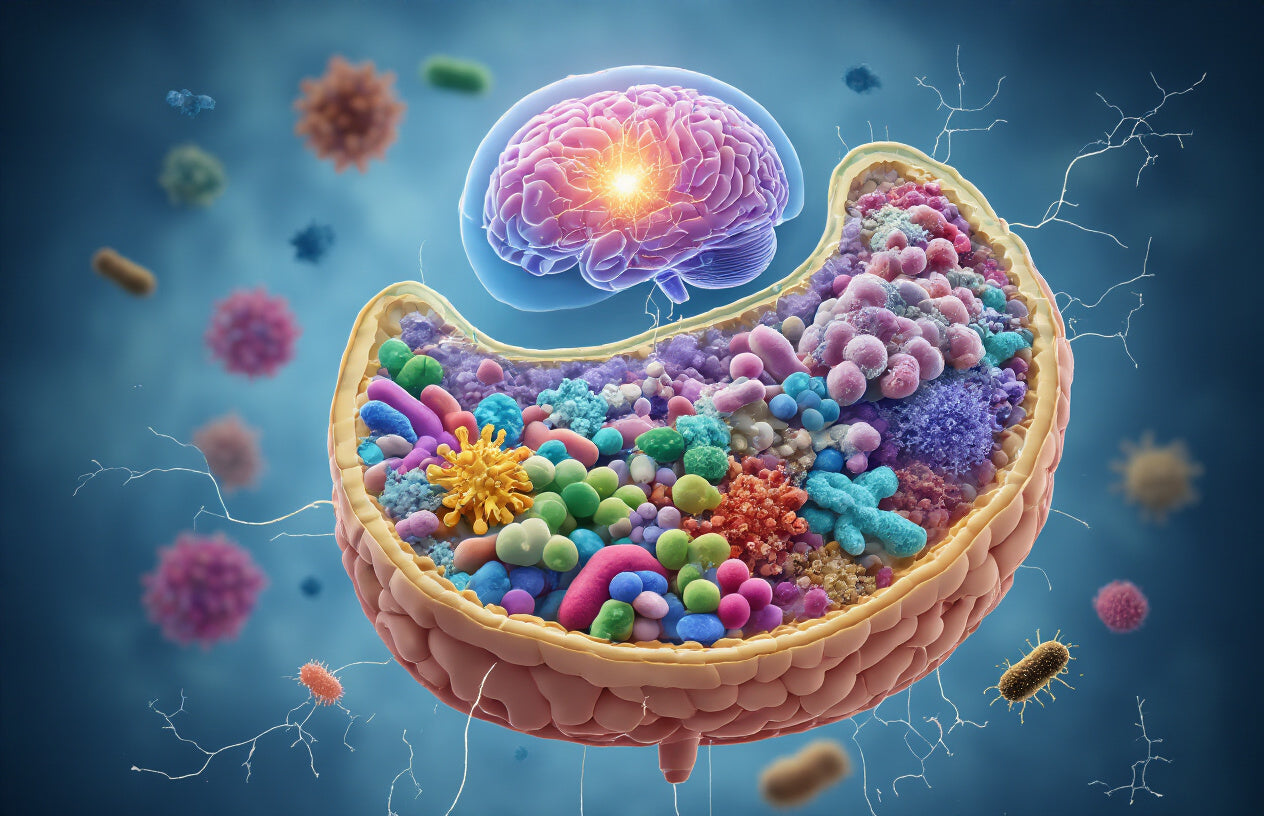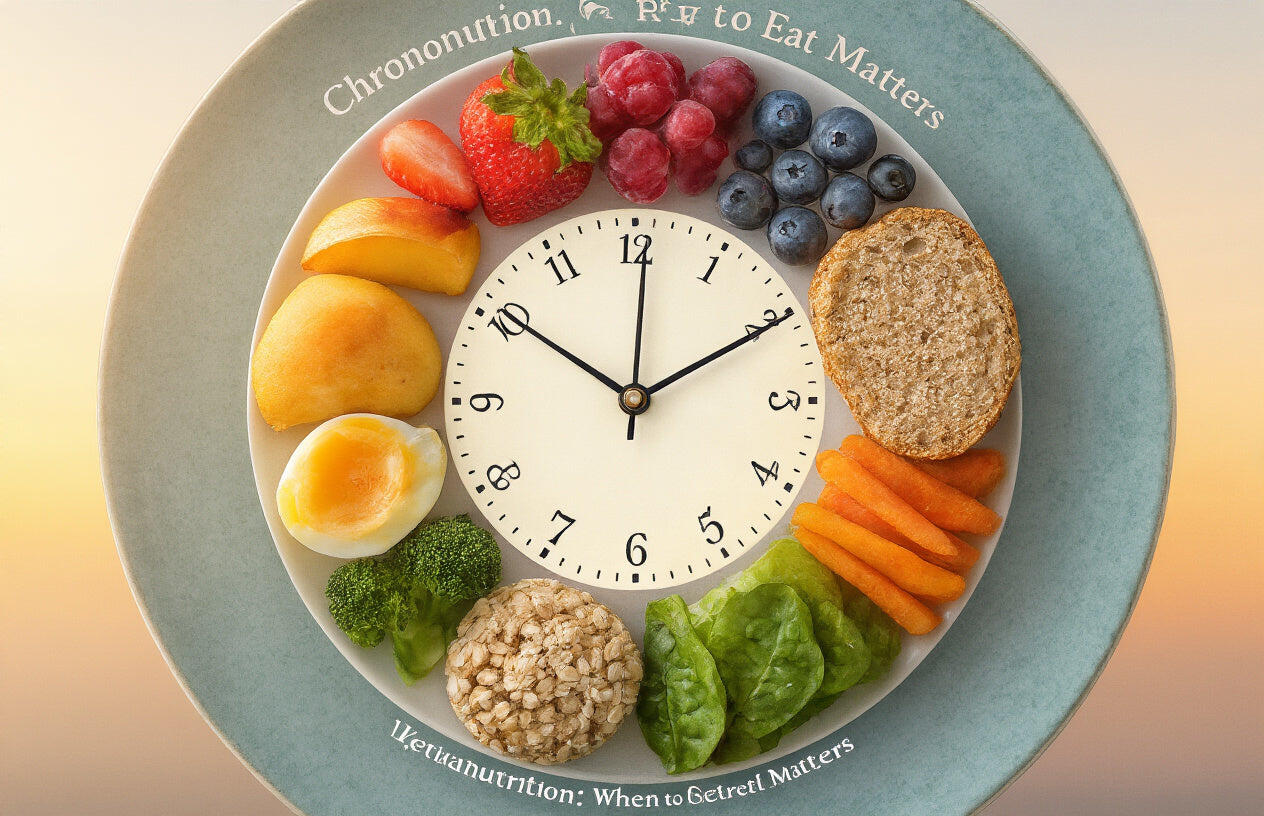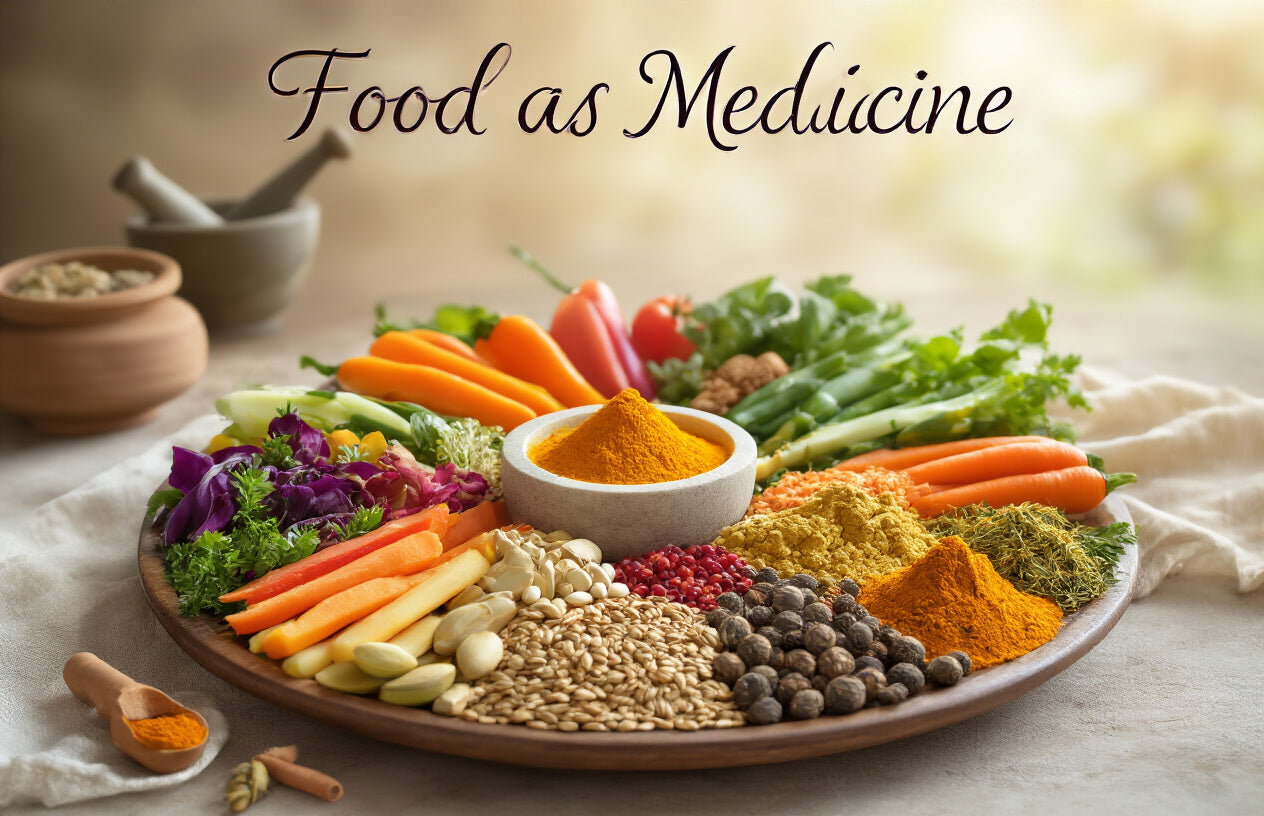The Gut-Brain Axis - Nutrition & Digestive Health
Your digestive system and brain talk to each other constantly, affecting everything from your mood to your immune function. This connection, called the gut-brain axis, is changing how we think about overall wellness. If you're struggling with digestive issues, mood swings, or just want to optimize your health, understanding this powerful connection is essential. In this guide, we'll explore how your gut microbiome influences brain function and share practical nutrition strategies to support this vital relationship. You'll learn which foods nourish both your gut and brain, and discover simple meal planning tips you can start using today.
Understanding the Gut-Brain Connection
How Your Digestive System Communicates with Your Brain
Ever noticed how butterflies flutter in your stomach when you're nervous? That's your gut talking to your brain.
This isn't just some woo-woo concept. Your gut and brain are constantly chatting through a complex network of signals. Think of it as texting your friend, but instead of emojis, they're using hormones, immune signals, and neural connections.
Your gut doesn't just digest food - it's packed with millions of nerve cells forming what scientists call your "second brain." This neural network in your digestive system is smart enough to control digestion independently, but it also keeps your main brain updated on what's happening downstairs.
The Vagus Nerve: Your Gut-Brain Superhighway
The vagus nerve is basically the information superhighway connecting your gut and brain. This massive nerve runs from your brainstem all the way down to your abdomen, touching almost every major organ along the way.
About 80% of its fibers actually carry information FROM your gut TO your brain - not the other way around. That means your gut has a lot to say!
When something's off in your digestive system, the vagus nerve tells your brain immediately. It's like having a dedicated hotline. This explains why digestive issues often come with mood changes. Your gut's literally sending stress signals upstairs.
Neurotransmitters Produced in the Gut
Surprise! Your gut makes many of the same chemicals your brain uses to regulate mood.
Take serotonin - the "happy chemical." A whopping 95% of your body's serotonin is actually produced in your gut, not your brain. GABA, the calming neurotransmitter that anti-anxiety medications target? Your gut makes that too.
Your gut bacteria are especially busy in this department. They help produce these mood-regulating chemicals, which is why the types of bacteria living in your gut can literally affect how you feel emotionally.
Impact of Gut Health on Mental Wellbeing
The connection between gut health and mental health isn't just theoretical - it's real and it matters.
Studies show people with digestive disorders are more likely to experience anxiety and depression. Meanwhile, those with anxiety or depression often report more digestive symptoms. It's a two-way street.
Your gut microbiome plays a starring role here. When your gut bacteria are balanced and diverse, they help maintain the gut barrier, reduce inflammation, and produce those mood-boosting chemicals we talked about. When things get imbalanced? Your mental health can take a hit.
That's why what you eat affects not just your physical health but your mental state too. Feed your gut well, and you're also feeding your mind.
The Microbiome's Role in Brain Function

A. Meet Your Gut's Trillion Bacterial Friends
Your gut is like a bustling metropolis, home to roughly 100 trillion microorganisms. That's more bacterial cells than human cells in your entire body. Wild, right?
These tiny residents aren't just hanging out—they're working 24/7 to keep you healthy. They break down food, produce vitamins, and protect you from harmful invaders.
The diversity matters too. Having various bacterial species is like having a well-rounded team where each player has a specific role. Some produce short-chain fatty acids that nourish your gut lining. Others manage inflammation. And a special group communicates directly with your brain.
Think about it: you're basically a human-shaped apartment complex for these microscopic tenants. And they pay rent by keeping your body functioning.
B. How Beneficial Bacteria Influence Mood and Cognition
Ever had a "gut feeling"? That's not just a saying—it's science.
Your gut bacteria produce over 30 neurotransmitters, including about 90% of your body's serotonin—yes, the "happy chemical." When these bacteria are happy, they send positive signals to your brain.
Here's what happens: beneficial bacteria like Lactobacillus and Bifidobacterium produce compounds that trigger vagus nerve signals. This nerve is like a superhighway connecting your gut and brain. When good bacteria thrive, they essentially text your brain saying "all good down here!"
This bacterial chatter affects everything from stress responses to memory formation. People with healthy gut microbiomes generally experience:
-
Better stress resilience
-
Improved memory
-
Clearer thinking
-
More stable moods
C. Dysbiosis and Mental Health Disorders
When your gut community falls into chaos—a condition called dysbiosis—your mental health can take a serious hit.
Studies show that people with depression, anxiety, autism, and even schizophrenia often have noticeably different gut bacteria compositions compared to those without these conditions.
It's a chicken-and-egg situation. Does dysbiosis cause mental health problems, or do mental health problems cause dysbiosis? The answer seems to be both. It's a feedback loop:
Stress → Altered gut environment → Microbial imbalance → More stress signals to brain → More stress
The evidence is compelling. Germ-free mice (with no gut bacteria) show exaggerated responses to stress. Give them some healthy microbes, and their behavior normalizes. Transfer gut bacteria from anxious humans to these mice, and suddenly the mice become anxious too.
D. The Science Behind Psychobiotics
Psychobiotics aren't sci-fi mind-control bugs—they're specific bacterial strains that can positively influence your mental state.
These bacterial superheroes work through multiple mechanisms:
-
Reducing inflammation that would otherwise impact brain function
-
Producing GABA, a calming neurotransmitter that puts the brakes on anxiety
-
Strengthening gut barrier function to prevent leaky gut
-
Modulating stress hormones like cortisol
Certain strains stand out in research. Lactobacillus rhamnosus has been shown to reduce anxiety-like behavior. Bifidobacterium longum improves cognitive function during stressful situations.
The most exciting part? Unlike many psychiatric medications, psychobiotics typically have minimal side effects.
E. Research Breakthroughs in Microbiome Studies
The microbiome field is exploding with discoveries that are reshaping how we think about mental health.
A groundbreaking 2019 study identified specific gut bacteria patterns in people with depression that weren't present in non-depressed individuals. This wasn't just correlation—transferring these bacteria to animals produced depressive behaviors.
Another milestone came when researchers at UCLA found that women who ate probiotic-rich yogurt showed altered brain activity in emotion-processing regions during an attention task.
The field is rapidly advancing with new technologies:
-
Metabolomics that identify the actual chemicals your gut bacteria produce
-
Advanced DNA sequencing that maps entire microbial communities
-
AI algorithms predicting which bacteria impact which brain functions
What's next? Personalized psychobiotic treatments based on your unique microbiome profile. Imagine a future where your psychiatrist prescribes specific bacterial strains tailored to your genetic makeup and current microbial population.
Nutrition Strategies for Optimal Gut-Brain Health

A. Prebiotic-Rich Foods That Feed Good Bacteria
Your gut bacteria are like hungry pets – they need the right food to thrive. Prebiotics are their favorite meal ticket.
These non-digestible food components feed your beneficial bacteria, helping them multiply and push out the troublemakers. The gut-brain connection gets stronger when these good bugs are well-fed and happy.
Some prebiotic superstars to add to your shopping list:
-
Garlic and onions (raw packs the biggest punch)
-
Jerusalem artichokes (don't let the name fool you – they're delicious)
-
Slightly green bananas (the resistant starch is gut gold)
-
Dandelion greens (bitter but worth it)
-
Asparagus (your gut loves what your pee hates)
Try adding just one prebiotic food daily. Your brain will thank you.
B. Probiotic Powerhouses for Digestive Balance
Think of probiotics as reinforcements for your gut army. They're the living good bacteria that support your digestive troops.
The science is clear – these microscopic allies influence everything from mood to memory by regulating gut inflammation and producing neurotransmitters.
Probiotic all-stars include:
-
Kimchi (spicy, fermented, and full of life)
-
Sauerkraut (the unglamorous gut hero)
-
Kefir (like yogurt but more powerful)
-
Kombucha (the hipster drink with actual benefits)
-
Miso (umami flavor with a side of good bacteria)
The trick? Eat them raw or unpasteurized when possible. Heat kills these beneficial bugs.
C. Anti-Inflammatory Eating Patterns
Chronic inflammation is like a constant alarm bell ringing in your gut that your brain can't ignore.
Your diet either feeds or fights this fire. Certain eating patterns have proven particularly effective at turning down the inflammatory volume:
The Mediterranean approach wins most scientific praise – abundant in:
-
Olive oil (liquid gold for your neurons)
-
Fatty fish (brain-building blocks)
-
Colorful vegetables (nature's anti-inflammatory pharmacy)
-
Nuts and seeds (small packages, massive benefits)
Timing matters too. Intermittent fasting gives your gut rest periods to repair and reset communication lines with your brain.
D. Foods to Limit for Better Gut-Brain Function
Some foods are like relationship saboteurs between your gut and brain.
Processed foods containing emulsifiers and artificial sweeteners are particularly problematic. They alter gut barrier function and microbiome composition, creating a chain reaction that affects brain health.
The worst offenders:
-
Ultra-processed foods (if it wouldn't spoil for months, be suspicious)
-
Added sugars (they feed the wrong bacteria)
-
Industrial seed oils (inflammatory omega-6 overload)
-
Artificial sweeteners (they mess with your microbiome)
-
Excessive alcohol (it damages the gut lining)
You don't need perfect elimination. Even reducing these foods by half can create significant improvements in your gut-brain communication.
Lifestyle Factors Affecting the Gut-Brain Axis

Stress Management Techniques for Gut Health
Your gut feels everything you feel. Seriously. That argument with your boss? Your microbiome noticed. That deadline stress? Your intestines are taking notes.
Chronic stress throws your gut bacteria into chaos. It's like setting off a fire alarm in your digestive system - inflammation increases, beneficial bacteria decrease, and harmful ones throw a party.
Try these practical approaches to calm both your mind and your gut:
-
Diaphragmatic breathing: Just 5 minutes daily lowers cortisol levels that disrupt digestion
-
Mindfulness meditation: Studies show it reduces IBS symptoms by up to 38%
-
Progressive muscle relaxation: Eases the gut-tensing response to stress
-
Nature walks: Even 20 minutes can reset your nervous system and calm digestive distress
Sleep Quality and Digestive Function
Poor sleep and poor digestion are basically roommates. When you skimp on sleep, your gut microbiome diversity drops faster than your phone battery at the end of the day.
One night of bad sleep can trigger gut permeability (leaky gut) by morning. And it works both ways – gut imbalances can mess with your sleep hormones.
The gut-sleep connection works through:
-
Circadian rhythm regulation of digestive enzyme production
-
Melatonin (partly produced in your gut) influences gut motility
-
Sleep deprivation alters gut barrier function
Exercise's Impact on Microbiome Diversity
Your microbiome loves when you move. Regular exercise increases beneficial bacterial species like Akkermansia (which strengthens your gut lining) and Lactobacillus (your digestive superhero).
Different workouts affect your gut differently:
| Exercise Type | Gut Benefit |
|---|---|
| Cardio (30+ min) | Increases SCFA production that feeds good bacteria |
| Strength training | Reduces gut inflammation markers |
| Yoga/stretching | Stimulates vagus nerve for better digestion |
| HIIT | Improves insulin sensitivity, affecting nutrient processing |
The sweet spot? About 150 minutes weekly of mixed moderate activity. Too little does nothing; too intense (like marathon training) can temporarily harm gut barriers.
Practical Meal Planning for Gut-Brain Support

A. Balanced Breakfast Ideas for Digestive Wellness
Your morning meal sets the tone for your gut health all day. Skip the sugary cereals and pastries that wreak havoc on your microbiome.
Try these gut-supporting breakfasts instead:
-
Overnight oats with chia seeds, berries, and a dollop of Greek yogurt
-
Veggie omelet with sautéed spinach, mushrooms, and a side of sauerkraut
-
Smoothie bowl with kefir, banana, and flaxseeds topped with walnuts
-
Avocado toast on sourdough bread with kimchi
The fiber-probiotic combo in these meals feeds your good gut bacteria while keeping inflammation at bay.
B. Gut-Friendly Lunch and Dinner Recipes
Midday and evening meals should balance protein, fiber, and fermented foods without overwhelming your digestive system.
Some winning combinations:
-
Buddha bowl with quinoa, roasted vegetables, chickpeas, and miso dressing
-
Wild salmon with prebiotic-rich asparagus and sweet potato
-
Turkey and vegetable soup with bone broth base
-
Mediterranean plate with hummus, olives, cucumber, and grilled chicken
Cooking methods matter too. Steaming and slow-cooking make nutrients more bioavailable and easier to digest than frying or charring.
C. Smart Snacking for Microbiome Health
Those afternoon hunger pangs? Perfect opportunity to nourish your gut-brain connection.
Microbiome-friendly snack options:
-
Apple slices with almond butter
-
Plain yogurt with honey and walnuts
-
Handful of berries with dark chocolate squares (70%+ cacao)
-
Veggie sticks with homemade tzatziki
-
Kombucha with a small handful of mixed nuts
The trick is combining fiber, healthy fats, and sometimes fermented elements while avoiding the blood sugar rollercoaster from processed snacks.
D. Meal Timing and Digestive Rhythm
Your gut has its own clock. Eating in sync with your circadian rhythm supports optimal digestive function and nutrient absorption.
Try these timing strategies:
-
Eat within a 10-12 hour window (e.g., 8am to 7pm)
-
Allow 3-4 hours between meals
-
Have your largest meal at lunch when digestive enzymes peak
-
Finish eating 2-3 hours before bedtime
This approach gives your digestive system time to clean house between meals – critical for maintaining the gut-brain highway.
E. Hydration Strategies for Optimal Gut Function
Water isn't just about quenching thirst – it's the foundation of healthy digestion and nutrient transport.
Boost your hydration game with:
-
Room temperature water with lemon first thing in morning
-
Herbal teas like peppermint, ginger, or chamomile between meals
-
Infused waters with cucumber, berries, or citrus throughout day
-
Bone broth as an afternoon drink
Aim for half your body weight (in pounds) in ounces daily, but distribute it thoughtfully – sipping between meals rather than flooding your system during eating.

The intricate relationship between our gut and brain plays a pivotal role in our overall health. As we've explored, the microbiome significantly influences brain function, with nutrition strategies like incorporating fermented foods, fiber-rich vegetables, and omega-3 fatty acids providing essential support for this vital connection. Meanwhile, lifestyle factors such as stress management, adequate sleep, and regular exercise are equally important in maintaining gut-brain harmony.
Taking simple steps toward better gut-brain health doesn't require a complete lifestyle overhaul. Start by gradually introducing probiotic-rich foods into your meals, practicing mindful eating, and prioritizing stress reduction techniques that work for you. Your gut and brain will thank you with improved mood, clearer thinking, and better overall wellness. Remember that small, consistent changes to your nutrition and lifestyle can yield significant benefits for your gut-brain axis and, ultimately, your quality of life.



Leave a comment
This site is protected by hCaptcha and the hCaptcha Privacy Policy and Terms of Service apply.